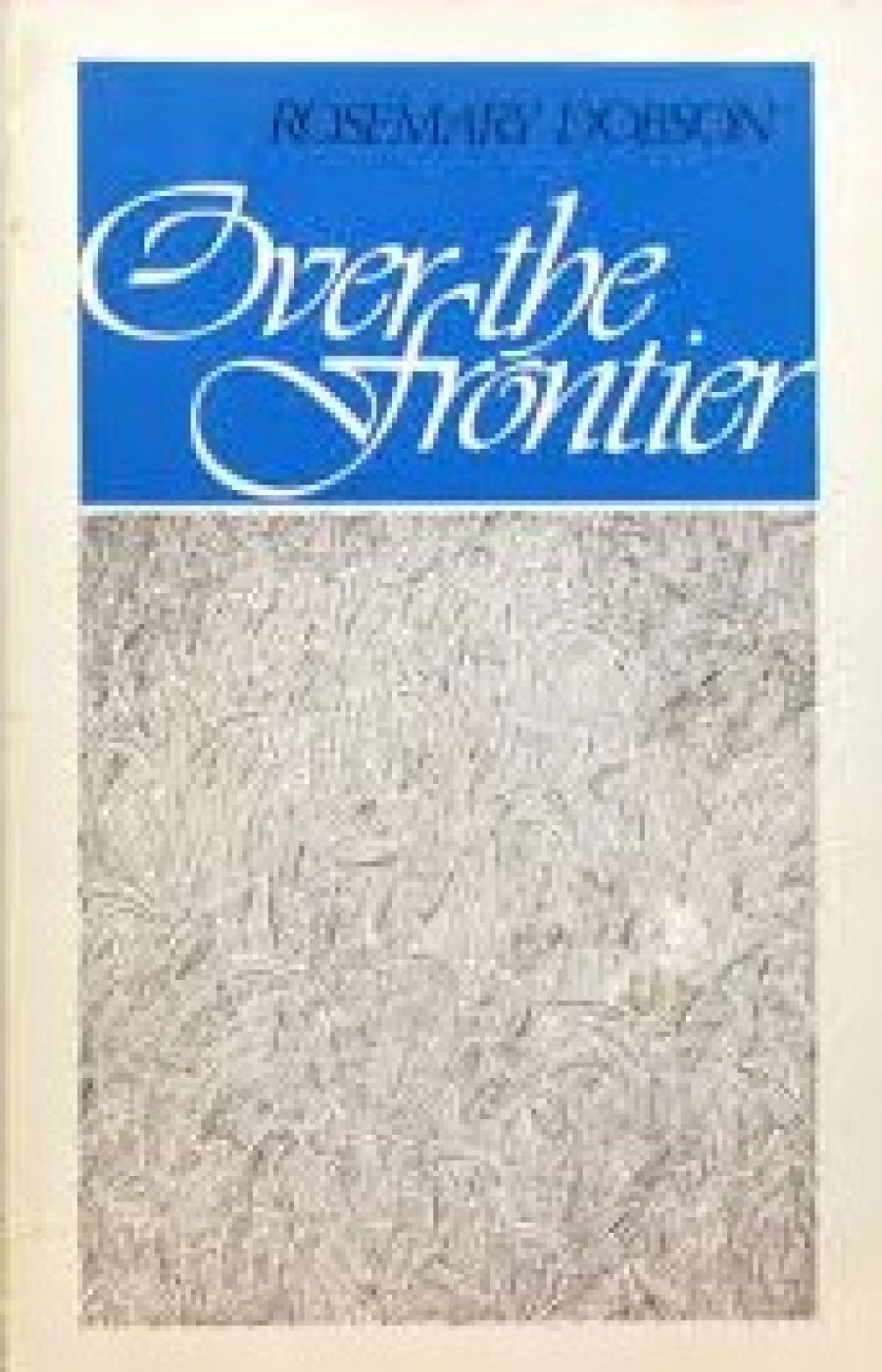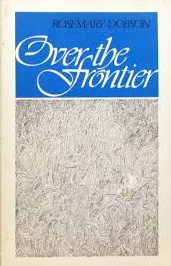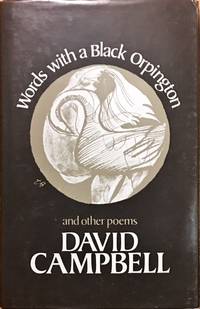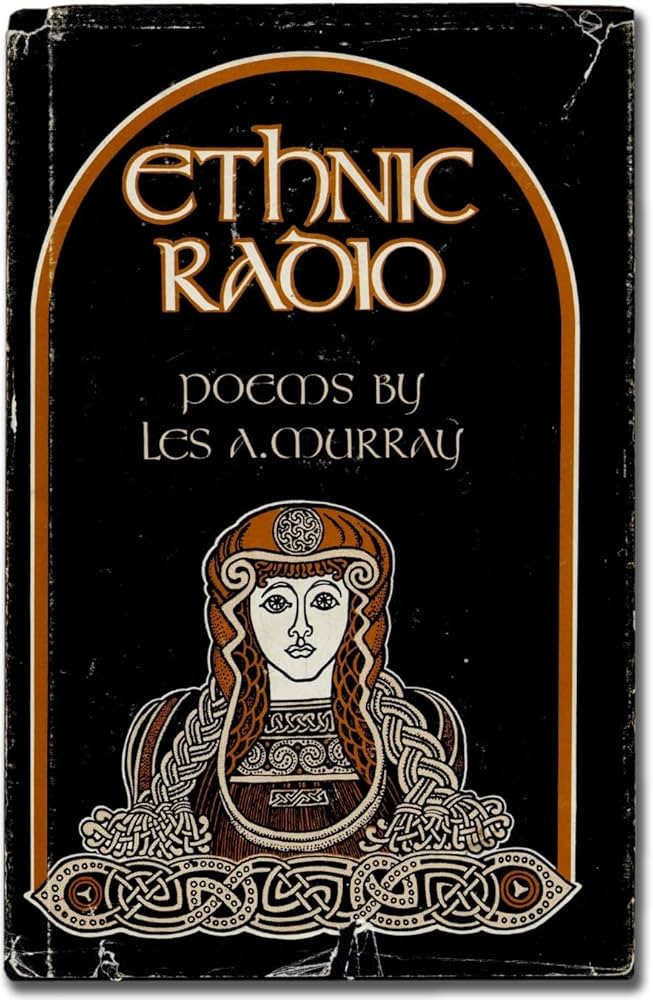
- Free Article: No
- Contents Category: Poetry
- Custom Article Title: Noel Macainsh reviews New Poetry
- Review Article: Yes
- Article Title: Bucolics, Greeks and senior citizens
- Article Subtitle: New poetry
- Online Only: No
- Custom Highlight Text:
These six books when held in the hand make up the thickness of a novel, and cost about $30.00 in all. The amount of typesetting must be far less than a novel. Five of them are printed in Hong Kong. Several acknowledge subsidy; one suspects they are all subsidised.
- Book 1 Title: Over the Frontier
- Book 1 Biblio: Angus and Robertson, $4.95 pb, $7.95 hb
- Book 1 Cover Small (400 x 600):

- Book 1 Cover (800 x 1200):

- Book 2 Title: Words With a Black Orpington
- Book 2 Biblio: Angus and Robertson, $4.95 pb, $7.95 hb
- Book 2 Cover Small (400 x 600):

- Book 2 Cover (800 x 1200):

- Book 3 Title: Ethnic Radio
- Book 3 Biblio: Angus and Robertson, $4.95 pb, $7.95 hb
- Book 3 Cover Small (400 x 600):

- Book 3 Cover (800 x 1200):

These six books when held in the hand make up the thickness of a novel, and cost about $30.00 in all. The amount of typesetting must be far less than a novel. Five of them are printed in Hong Kong. Several acknowledge subsidy; one suspects they are all subsidised. Perhaps the costs don’t matter to the particular buyers concerned. However, the impression of a minority phenomenon is unavoidable; and this seems to be tacitly acknowledged by the poets themselves. They turn inward, backward, become reminiscent, delve into old books. Age may have something to do with it. The youngest of these poets is thirty-eight years of age, one is forty, the rest are sixtyish or more. Two are retired surveyors.
Alec Choate, one of the surveyors, writes mostly occasional poems, often set out-of-doors. They are essentially descriptive pieces:
This is the sculptor’s workshop. It has no
walls,
And past its roof-thatch raftered with
bamboos
The sunlight steps in by my side …(Sculptor)
In poems about Bali, he is the reflective tourist, eminently sane, objective; limits are acknowledged, passions are kept in hand:
I share their awe, though that is all I
share(Purification Ceremony)
He goes as a stranger to the dance of Good and Evil, ‘yet, like any villager,/I can play with the play’s heart if I will.’ At the end of the play, he too puts on a mask:
… We rise to go,
The players through the temple having
gone
And hearing at the gates a vendor call
I buy a monkey mask and put it on.(Barong and Rangda)
It is a nice touch. Alec Choate appears to be a late starter. His style could pass for the 1930s or earlier; a lot of iambic pentameter with rhyme, and occasional inversions of syntax; an old-fashioned instrument, but very nicely handled:
She sleeps on the couch which seems like
another body
As voluptuous as hers.
As middle-aged and as a comforting in its
velvet …(She Sleeps on the Couch)
Alec Choate’s military poems, of Egypt and Borneo must have a claim for inclusion in any war-anthology. They are not as skilled as poems written later, but nevertheless are strongly moving. In the two long narratives, ‘On the Frontier’ and ‘The Rearguard’, dealing with the horrible contingency and madness of war, the dated style suggests a groping for something firm and traditional to hold onto. There are some striking images, very powerful in context:
… The great
Divisions of stars, impassive to our fate,
Took up their cool positions …
Or –
An inflammation on a withered skin,
And so the sun rose from the barren plain(The Rearguard)
If Alec Choate’s verse is very much of life, then Rosemary Dobson’s is equally much of literature. Compared to this sort of stuff, Alec Choate hasn’t got a chance. He may have risked life and limb in the murderous desert, but the dominant aesthetic of his country is aestheticism, art-for-art’s sake, a classicistic mulling on the presumed eternal truth of the deathless works of the past, against which life’s soldiers of today are as impotent as peasants trying to gate-crash a feudal lord’s garden-party. The soldier-poet writes:
… the raid
Was over, and I lived. What had I done
To earn such luck and come through
Overpaid?
The authoress of art, with prudent reservation, writes:
In nineteen hundred and seventy-five
I would give many another thing
to fine a helmet cast in bronze,
a little pipe beside a spring,
… or any artefact that linked
the past to what is here and now
and so persuade myself that some
scholar two centuries away
might find a few brief words of mine
and recognise in what I say
the voice that speaks to one alone …
(The Message in the Bottle)
This exclusivity and presumption on the future is a well-worn staple, one of the gilded turds of Aust. Lit. The connection of past, present and future is rarely effected by technology but usually by means of bones, bottles, shards, fragments chanced upon by ‘scholars’. The message itself is hardly ever momentous; it is either some great banality or the precious recognition of the author’s very own ego. Perhaps it is irreverent to ask why the better sorts of suburb throw up this kind of pretension. Surely, they have everything already; what more could they want? Immortality? Distinction, salvation from the ambient sea of nobodies implied in their poetic stance? Nevertheless, for readers who are in the market for a tastefully done classicism, this should be just the book. About half the volume, the ‘Greek Coin’ sequence, is said to be inspired by Pausanias’ Guide to Greece, written in the second century A.D. Elsewhere, there is more of Greece. some other archaeology, art, and a little bit of Canberra. Perhaps there is really a lot of Canberra.
If Rosemary Dobson gives us the aristocracy of art, then David Campbell gives us its squattocracy. Here, again the reader is offered time a Grecian interlude, Volume No. 1, edited and translated by J.M. Edmonds for the Loeb Classical Library. With this, there goes an admixture of the Canberra countryside plus a quick round of the watering-holes of culture: Oxford, Paris (lots of French material), a Grand Tour of the Continent, the Watling Collection, and so back to the paddocks. The ‘fleshly school’ of readers should also find something to its liking among the olde-worlde romps with the ladies. There’s plenty of tit and heart-cleaving rump:
Her belly is flat as a board
And her wooded mount
Is hard, hard, hard.
But her breasts move like slow bells
And the clef of her buttocks
Cleaves the heart(Portrait of a Lady)
There’s also something for the children:
Mummy, you are delicious, How does one
know
Whether to be a phallus or a tit?(Looby Songs)
Maybe ask Anita Bryant. But, basically, it’s good old colonial, cigars-and-port kind of verse.
After a spell in the eventide world of the Canberra classicists. Geoffrey Lehmann’s work expands on the reader (on this one at least) like a vast horizon. Yet it is essentially intimate portraiture; no jaunts among Greek coins or Freudian part-objects, but narratives about real people; with their photographs included. No ‘aristocracy-ofart’ stuff here; quite the contrary:
It’s not hard to choose between
low infant mortality and an art nouveau
tile.
There’s no nostalgia
About women nursing dying children
on finely carved cedar beds
with embroidered linen(Poem No 67)
Again and again, among these quiet, lowkey narratives, a strikingly poignant or delightful characterisation will emerge:
No one dared read the tea-leaves
of Mr Long’s billy, emptied
(as he thought)
Through the open window of his hut
But splattering on the pane, just cleaned
of twenty years cobwebs by my brother(Poem No 68)
or
(like Mrs Stinson – as children we loved
to see her holding her missal upside down
in church, poor woman)(Poem No 78)
This is ruminative, conservative, countryman’s verse; down-to-earth, sane, and very moving. I wish I had more space to point out its virtues. Buy it.
Compared to Lehmann. Les Murray, in Ethnic Radio, is more showy, a wordsman, a Celtic gift-of-the-gab man. His fluency leads you on so quickly, that often you have to go back for the meaning. And it’s usually worth it. There are lots of bright nuggets packed into the ore. Rear-guard, rural and mystical anarchist that he is, he must be currently the deftest writer in the business. Like a tricky Celt, he can skip and jig with you, fool around very neatly, be ‘cranky and magnificent’, and he can also faze you like the slow movement of the Kreutzer Sonata. Many of the poems appear to be occasional. Australian and Gaelic themes predominate. The Buledelah-Taree Holiday Song Cycle’ is a long description that begins at lunch-time, ‘The people are eating dinner in that country north of Legge’s Lake’. It evokes a broad geography and a rich variety of holidaying people until finally ‘the Cross is rising on his elbow … above the Holiday’. It is a delightful addition to the genre of the ‘district poem’. Another outstanding poem is ‘Immigrant Voyage’, aptly characterising diverse experience at both ends of the voyage. Some of the shorter pieces, such as ‘Rainwater Tank’ and ‘Creeper Habit’, are gems of their kind that could shine well in the mixed company of any Australiana anthology. Not least of Murray’s virtues is an excellent sense of humour.
Thirty-four years ago, a critic in Angry Penguins wrote of R. D. Fitzgerald’s poetry that ‘some of it is at first obscure; but the obscurity disappears after a while, it is neither deliberate nor careless, and there is usually some gold in the pan.’ Much the same might still be said of this new collection of verse, Product, apparently Fitzgerald’s twelfth volume. Included are some anti-war pieces, a theme that appears to be almost generally obligatory, well-done here, yet depressing in its impotence. Many of the poems, as befits the poet’s age, are reflective. Sometimes be promises to reflect on that too:
No doubt I have lived too long. What my
world was goes – where one’s way of
looking at it went
But then he disappoints with a rehearsal of old and even testy attitudes:
… I like a tune well sung,
not cranky music. As for abstract,
the painters not their products should
be hung …
And so on. Grandpa is crotchety. It’s a pity. Better by far to let explorations, such as ‘Invocation of Josef Asela’ and ‘The Road North’, both included here, stand alone without the polemic. They are milestones in a fine career.


Comments powered by CComment